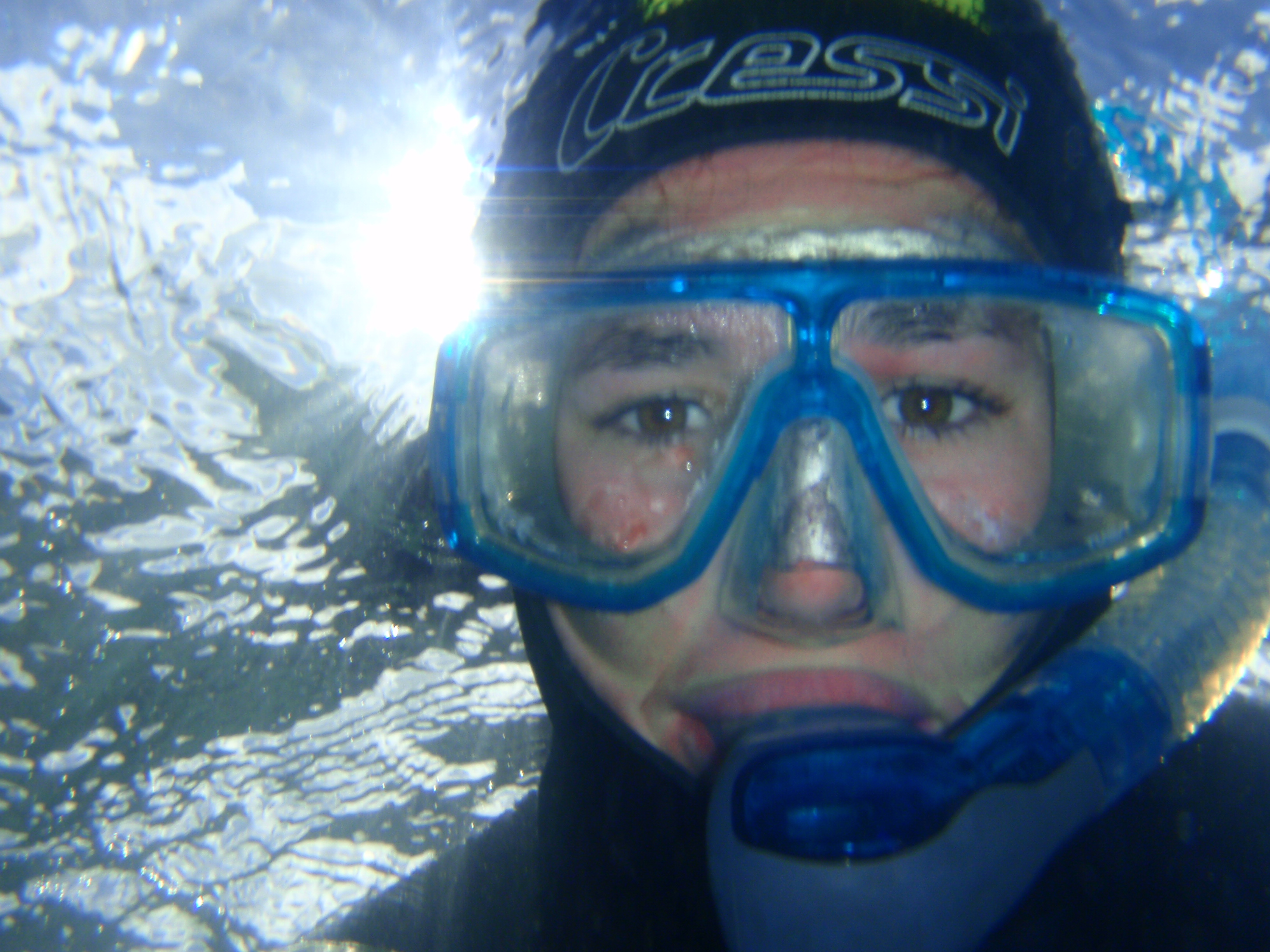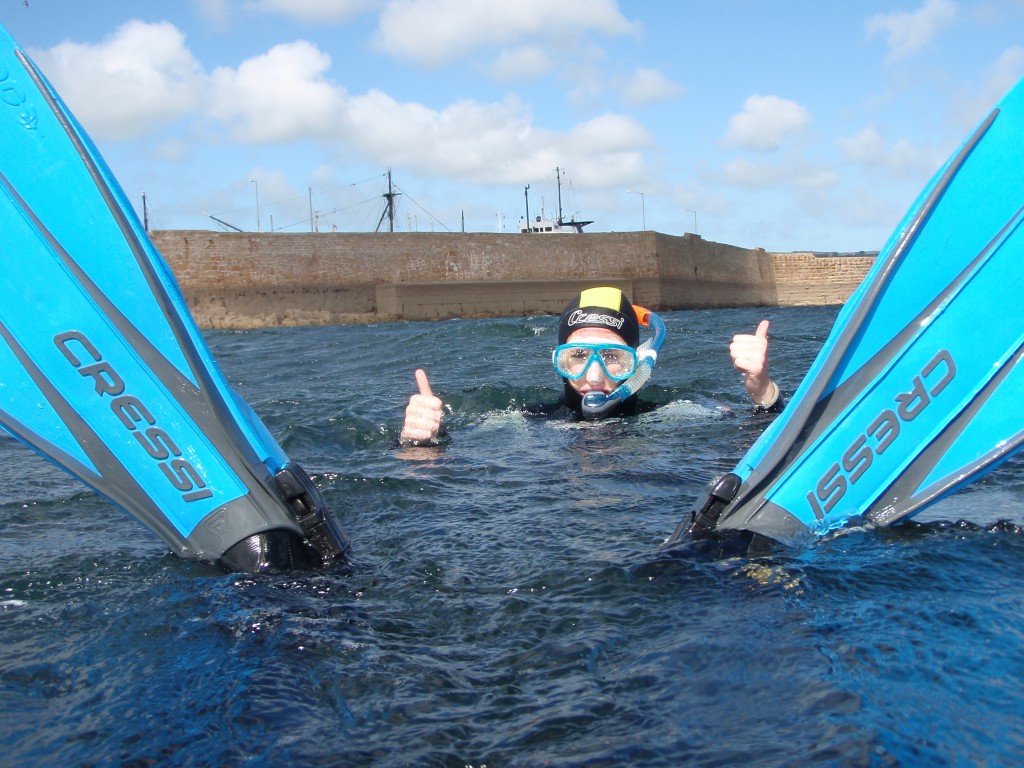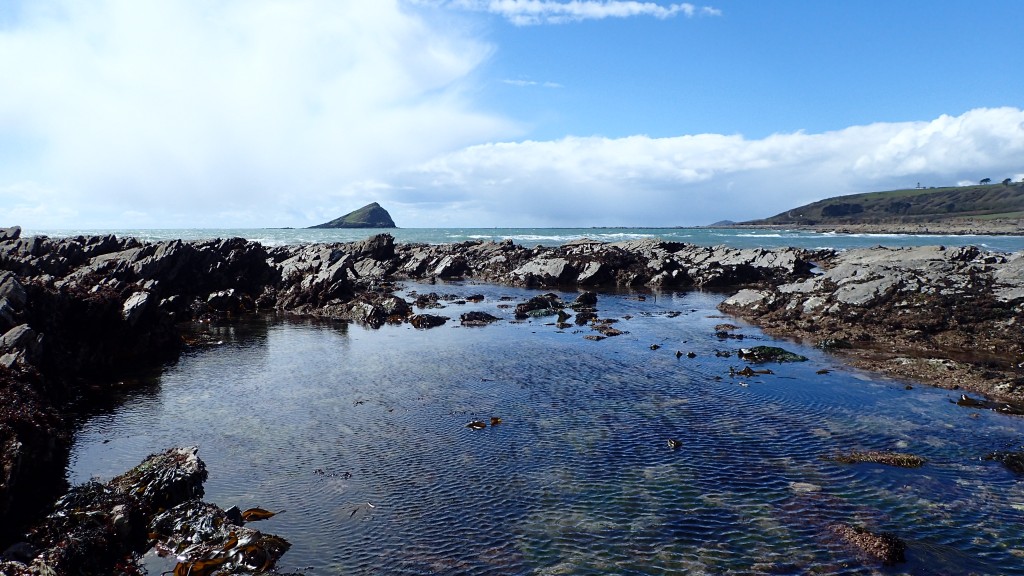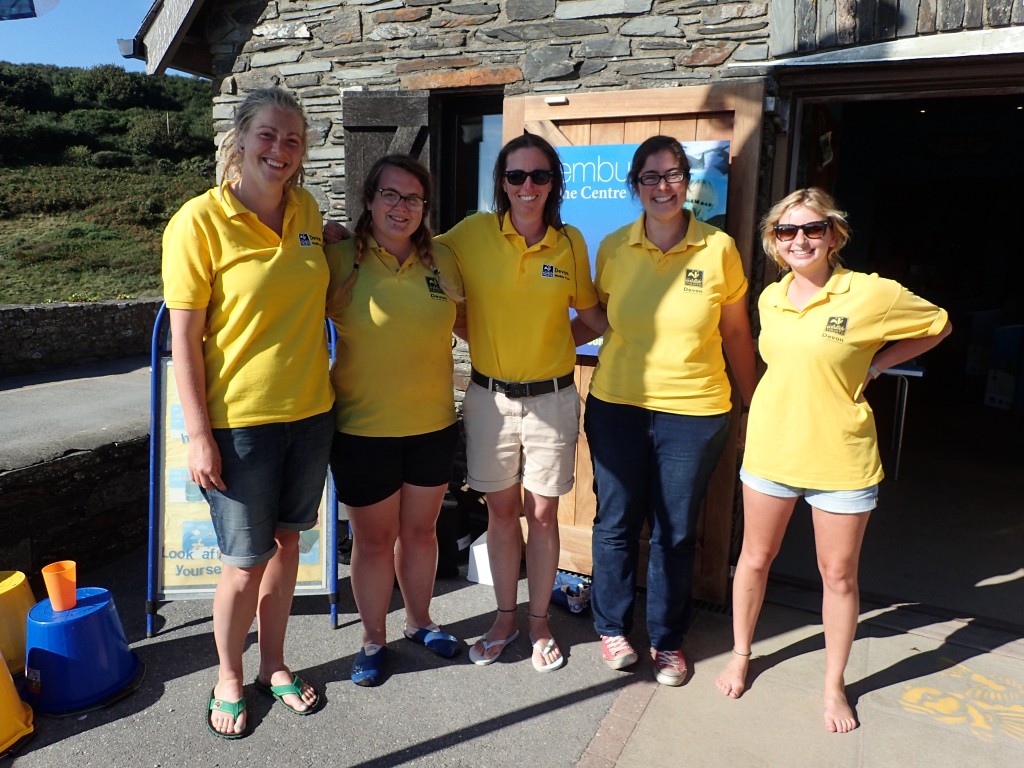Marine Life & Conservation
Hello from Wembury!

Meet Coral Smith, Marine Education Officer for Devon Wildlife Trust and Scubaverse.com’s newest blogger
Hello Scubaverse and fellow dive enthusiasts and thank you for inviting me to contribute to your blog! So, I’ve been asked to write a regular blog about the work I do to promote marine awareness and conservation in the UK, but before we get onto that I thought I’d give you a bit of background about myself and how I got started.
Growing up in landlocked Hertfordshire (not too far from Scubaverse HQ), it wasn’t until a summer holiday to Lyme Regis in Dorset, when I was about 4 or 5, that I got my first taste of the sea and marine life, rockpooling with my dad in tide-pools that seemed to go on forever. I like to think that’s where my interest in marine life started…
Moving on to when I was nine years old, our family moved to the Caribbean and I was lucky enough to have an amazing underwater world right on my doorstep. The sea then became a part of my life, as I’m sure it does for lots of people living on a small, beautiful island. Every weekend I was snorkelling on warm tropical coral reefs and Parrot fish soon became my favourite, as was watching the magical flying fish skim out of the water as the sun set on another day in paradise. But it was my first time swimming with green turtles that really did it for me and I just fell in love with the ocean and everything that lived there.

Coral taking part in a PADI Project Aware course whilst volunteering at Wembury Marine Centre. Copyright: Devon Wildlife Trust
Four years in the Caribbean and then it was time to move back to Hertfordshire. After finishing school, I headed to Plymouth University to undertake a degree in Marine Biology and Oceanography. Here I learned that Marine Biology wasn’t all about swimming with turtles and dolphins in nice warm tropical water and that I’d probably never get a job in this field, but I managed to come away with a first class honours degree and went on to do a Masters in Biological Diversity. My lecturer was right about the job thing though, as I came out of uni and didn’t immediately land the job of my dreams, or any job even close… I guess I hadn’t really thought that far ahead! So I spent a couple of years doing various voluntary placements before finally landing a part time role in the education team at the Marine Biological Association of the UK, based in Plymouth. I spent three years working in a lovely team there, before moving on to my current role as Marine Education Officer for Devon Wildlife Trust, based at Wembury Marine Centre.
Wembury was my first full time voluntary placement back in 2009, and like so many other people now working in environmental education and outreach in the South West and beyond, it all started here. Wembury is a magical place, felt by both the locals and the tens of thousands of visitors who flock here each year. It’s not the best looking beach by any means – it’s pretty small, lots of the sand comes and goes, but the rocky shore and view of the Mewstone (a small island just over a kilometre out) is simply stunning. It must be up there as one of the most photographed and painted spots around and is a favoured filming location for numerous BBC Natural History programmes.
Historically, Wembury holds one of the richest biodiversity hotspots for intertidal marine life in the UK, and in recognition of this Wembury Bay was set up as a Voluntary Marine Conservation Area (VMCA) in 1981 and now also forms part of the Plymouth Sound and Estuaries Special Area of Conservation (SAC).
Wembury Marine Centre opened in 1994 and was the inspiration of marine biologist, the late Dr Norman Holme. Today, the Centre is managed by Devon Wildlife Trust (DWT) on behalf of a partnership including the National Trust, South Hams District Council, Devon County Council and Plymouth University Marine Institute.
My colleague Cat and I manage the Centre, both working for DWT, and each year we are supported by a small team of trainees and interns thanks to our partnership with the Marine Institute and other placement schemes. The purpose of our outreach work here is to promote Wembury as a Marine Conservation Area and to create a sense of marine stewardship among the local community and visitors alike. Our work also extends beyond Wembury, promoting The Wildlife Trusts’ vision of ‘Living Seas,’ where the marine environment is managed sustainably for the benefit of all its inhabitants and where people are inspired by marine wildlife and value the sea for the many ways in which it supports our quality of life.
Over the next few months you will hear more about the marine conservation work we do and some of the more interesting and bizarre stories from our little Bay in South Devon.
For more info visit:
Marine Life & Conservation
Leading UK-based shark conservation charity, the Shark Trust, is delighted to announce tour operator Diverse Travel as a Corporate Patron

 Corporate Patrons provide a valuable boost to the work of The Shark Trust. The Trust team works globally to safeguard the future of sharks, and their close cousins, the skates and rays, engaging with a global network of scientists, policymakers, conservation professionals, businesses and supporters to further shark conservation.
Corporate Patrons provide a valuable boost to the work of The Shark Trust. The Trust team works globally to safeguard the future of sharks, and their close cousins, the skates and rays, engaging with a global network of scientists, policymakers, conservation professionals, businesses and supporters to further shark conservation.
Specialist tour operator Diverse Travel has operated since 2014 and is committed to offering its guests high quality, sustainable scuba diving holidays worldwide. Working together with the Shark Trust will enable both organisations to widen engagement and encourage divers and snorkellers to actively get involved in shark conservation.
“Sharks are truly at the heart of every diver and at Diverse Travel, we absolutely share that passion. There is nothing like seeing a shark in the wild – it’s a moment that stays with you forever!” says Holly Bredin, Sales & Marketing Manager, Diverse Travel.
“We’re delighted to celebrate our 10th year of business by becoming a Corporate Patron of the Shark Trust. This is an exciting partnership for Diverse and our guests. We will be donating on behalf of every person who books a holiday with us to contribute towards their vital shark conservation initiatives around the world. We will also be working together with the Trust to inspire divers, snorkellers and other travellers to take an active role – at home and abroad – in citizen science projects and other activities.”
Paul Cox, CEO of The Shark Trust, said:
“It’s an exciting partnership and we’re thrilled to be working with Diverse Travel to enable more divers and travellers to get involved with sharks and shark conservation. Sharks face considerable conservation challenges but, through collaboration and collective action, we can secure a brighter future for sharks and their ocean home. This new partnership takes us one more valuable step towards that goal.”
For more information about the Shark Trust visit their website here.
For more about Diverse Travel click here.
Marine Life & Conservation
Shark Trust Asks Divers to help with Shark Sightings this Global Citizen Science Month

 Whether you are stuck for ideas of what to do with the kids or are off on the dive trip of your dreams. You can get involved in Citizen Science Month and help the Shark Trust by providing vital data about sharks are rays both close to home and further afield.
Whether you are stuck for ideas of what to do with the kids or are off on the dive trip of your dreams. You can get involved in Citizen Science Month and help the Shark Trust by providing vital data about sharks are rays both close to home and further afield.
In addition to reporting the sharks and rays you see on your dives, the eggcases you find on the beach, the Shark Trust is looking for some specific data from divers who are asked to report any Oceanic Whitetip and Basking Sharks.
Oceanic Whitetip Sharks
The Shark Trust are looking specifically for Oceanic Whitetip Shark sightings over the coming weeks and months. So, if you are diving anywhere in the world, please report your sightings via the website or app.
Website: https://recording.sharktrust.org/
App: Search The Shark Trust in your app store
The Oceanic Whitetip. Known for their incredibly long dorsal and pectoral fins, this species was once the most abundant oceanic-pelagic species of shark on the planet.
Large and stocky, they are grey or brown above, and white below and famous for their huge rounded first dorsal fin and paddle-like pectoral fins. The fins also highly prized within the shark fin trade. Whilst they are mostly solitary, Oceanic Whitetips do occasionally hunt in groups.
An inquisitive species, they were easy prey for fisheries. Combined with their low reproductive rate, they were inevitably at high risk of population depletion. And declines of up to 99% have been reported in certain sea areas. They are listed as Critically Endangered on the IUCN Redlist (2019).
Conservation efforts to discourage further declines include listing on CITES Appendix II and CMS Appendix I. They’re also the only species prohibited from take by all the Tuna RFMOs (Regional Fisheries Management Organisations). However, these measures do not mean that Oceanic Whitetips are not still caught – whether targeted or as bycatch – in some parts of the world. With populations declining at such a high rate, effective implementation of management measures is essential to ensure that the species can recover.
If you are lucky enough to get an image of an Oceanic Whitetip and you record your sighting on the Shark Trust app or website YOU CAN WIN! All images submitted with sightings, that also give consent to use in conservation messaging, will be in with a chance to win an Oceanic Whitetip T-shirt and mug. The competition will run until the end of “Shark Month” in July – so keep those sightings (and images) coming in.
Basking Sharks
Basking Shark (Cetorhinus maximus) season is upon us, and the Shark Trust is asking everyone to keep an eye out for these majestic giants over the summer months. If you see any, you can record your sighting to the Basking Shark Sightings database.
Each year, these mighty fish return to British waters to feed on plankton. You may see one, (or a few if you’re really lucky) from around April-October. They can be seen feeding at the surface of the water, where they look like they’re basking in the sun. Thus, their name!
Sighting hotspots around the British Isles include southwest England, Isle of Man, north coast of Ireland, and western Scotland. The Sea of the Hebrides is the most prolific sightings area in Scotland, but they have been spotted all around the coast and have even ventured into some of the sea lochs. The Shark Trust has received thousands of sightings since the Basking Shark project began, but more data is needed to truly understand what is going on with population numbers and distribution. You can help by recording your sightings this summer.
Great Eggcase Hunt
The Shark Trust has an Easter Egg Hunt with a difference for you to try. Take part in the Great Eggcase Hunt and get involved with a big citizen science project that helps shark, ray and skate conservation. And it’s an enjoyable activity for all the family.
The Shark Trust also want snorkellers and divers to record their underwater eggcase findings. Underwater records help pinpoint exactly where sharks and skates are laying their eggs and can help link to beach records. Learning the depth and substrate that they lay on also helps better understand the species.
Find out more: https://www.sharktrust.org/great-eggcase-hunt
Whether you are diving, snorkelling or exploring on the beach you can take part in Citizen Science Month and get actively involved in shark and ray conservation. Find out more: www.sharktrust.org
-

 News3 months ago
News3 months agoHone your underwater photography skills with Alphamarine Photography at Red Sea Diving Safari in March
-

 News2 months ago
News2 months agoCapturing Critters in Lembeh Underwater Photography Workshop 2024: Event Roundup
-

 Marine Life & Conservation Blogs2 months ago
Marine Life & Conservation Blogs2 months agoCreature Feature: Swell Sharks
-

 Blogs2 months ago
Blogs2 months agoMurex Resorts: Passport to Paradise!
-

 Blogs2 months ago
Blogs2 months agoDiver Discovering Whale Skeletons Beneath Ice Judged World’s Best Underwater Photograph
-

 Gear News3 months ago
Gear News3 months agoBare X-Mission Drysuit: Ideal for Both Technical and Recreational Divers
-

 Gear Reviews2 months ago
Gear Reviews2 months agoGear Review: Oceanic+ Dive Housing for iPhone
-

 Marine Life & Conservation2 months ago
Marine Life & Conservation2 months agoSave the Manatee Club launches brand new webcams at Silver Springs State Park, Florida











